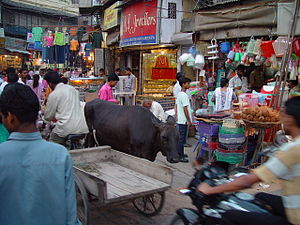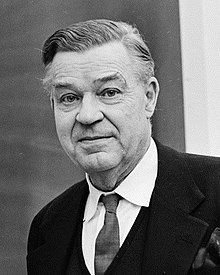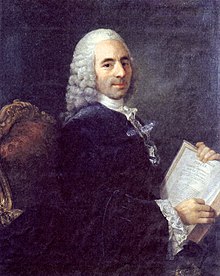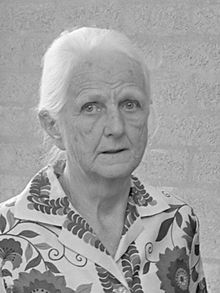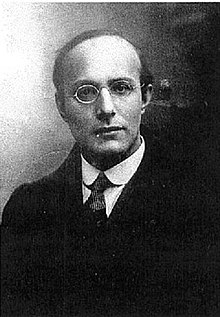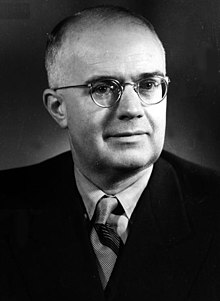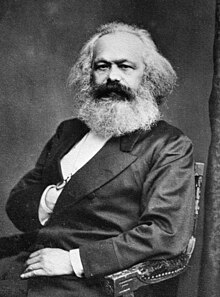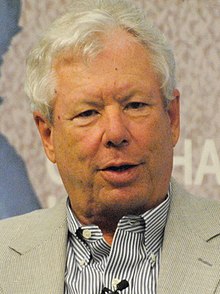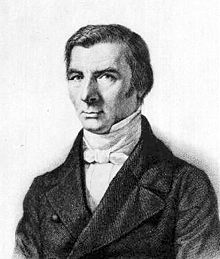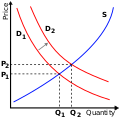Portal:Economics
Introduction
Economics (/ˌɛkəˈnɒmɪks, ˌiːkə-/) is a social science that studies the production, distribution, and consumption of goods and services.
Economics focuses on the behaviour and interactions of economic agents and how economies work. Microeconomics analyses what is viewed as basic elements within economies, including individual agents and markets, their interactions, and the outcomes of interactions. Individual agents may include, for example, households, firms, buyers, and sellers. Macroeconomics analyses economies as systems where production, distribution, consumption, savings, and investment expenditure interact, and factors affecting it: factors of production, such as labour, capital, land, and enterprise, inflation, economic growth, and public policies that have impact on these elements. It also seeks to analyse and describe the global economy. (Full article...)
Selected general articles
Did you know...
- ... that the petunia carnage of 2017 led to worldwide economic losses?
- ... that anti-Korean sentiment, due to South Korea's economic growth, motivated Djuna to write the sci-fi novel Counterweight?
- ... that in a study for UNICEF, Reginald Green found that more than two million children under the age of five had died in Angola and Mozambique due to the South African apartheid regime's economic policies?
- ... that people are robbing Lebanese banks to get their own money back?
- ... that a banker was named the prime minister of Equatorial Guinea after his predecessor resigned during an economic crisis?
- ... that soprano Galina Pisarenko studied economics, English, and Norwegian at the same time she was studying to become a professional opera singer?
Need help?
Do you have a question about Economics that you can't find the answer to?
Consider asking it at the Wikipedia reference desk.
Get involved
For editor resources and to collaborate with other editors on improving Wikipedia's Economics-related articles, see WikiProject Economics.
Selected images
In the news
- 20 November 2024 – German economic crisis
- American automaker Ford announces that it will cut 4,000 jobs in Europe, including 2,900 in Germany, citing economic instability and conflicts with environmental regulations. (Newsweek)
- 29 October 2024 – German economic crisis
- German metalworkers union IG Metall begins a labor strike over the working conditions and wages of 3.9 million workers in the country. (DW)
- 23 October 2024 – Russian invasion of Ukraine
- The U.S. Defense Department finalizes a US$20 billion loan to Ukraine for military and economic support as part of a collective US$50 billion loan between G7 members. (Reuters)
- 23 October 2024 – Demographics of Germany, German economic crisis
- The Ifo Institute for Economic Research reports that Germany experienced a 13% birth rate decline nationally and up to a 17.5% birth rate decline in eastern Germany between 2021 and 2023, with the institute attributing the decline to several reasons including the COVID-19 pandemic, the Russo-Ukrainian war, and high inflation. (DW)
- 14 October 2024 – Nobel Memorial Prize in Economic Sciences
- This year's Nobel Prize in economics is awarded to Turkish-American economist Daron Acemoglu, British-American economist Simon Johnson, and British economist James A. Robinson for their studies "of how institutions are formed and affect prosperity". (The New York Times) (Nobel Prize)
Subcategories
Subtopics
Associated Wikimedia
The following Wikimedia Foundation sister projects provide more on this subject:
-
Commons
Free media repository -
Wikibooks
Free textbooks and manuals -
Wikidata
Free knowledge base -
Wikinews
Free-content news -
Wikiquote
Collection of quotations -
Wikisource
Free-content library -
Wikiversity
Free learning tools -
Wiktionary
Dictionary and thesaurus


